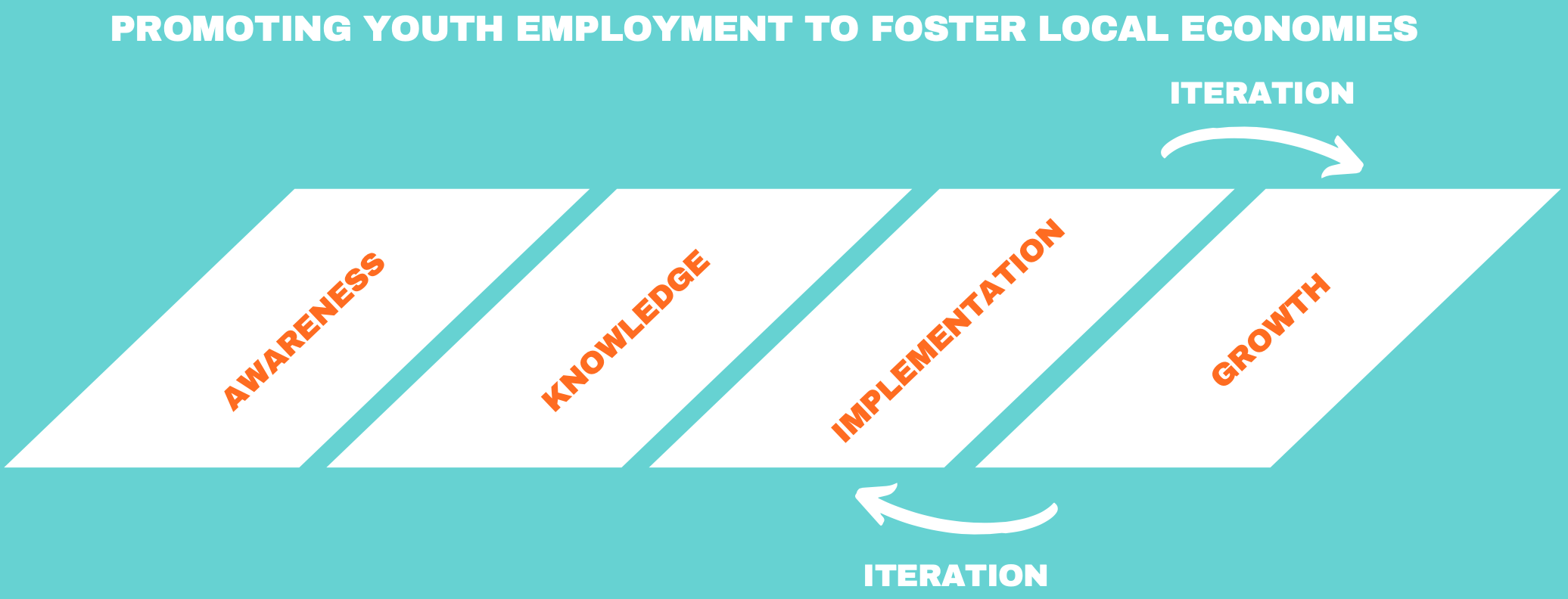In 2019, Yunus & Youth designed and implemented, in collaboration with UNDP São Tome and Príncipe and the local government, a program dedicated to supporting young people in the development of innovative business solutions that address local socio-environmental issues, positively impacting the region and its economy.
In this article, we will share more about our experience and the stories of the young social entrepreneurs impacted by the Social Business Journey.

São Tomé and Príncipe (STP) is an African island country near the equator with a population of around 200 thousand people where youth unemployment represents one of the biggest economic challenges. Given that youth (between the ages of 15 and 24) represent 52% of the population, this situation is a huge matter for concern. According to The World Bank, the unemployment rate in STP was 20% in 2018. The government’s inability to generate employment makes youth the most vulnerable segment of the population.
The lack of employment opportunities for youth, combined with their potential to develop innovative solutions for their community encouraged UNDP São Tomé and Príncipe to launch a national initiative to invest in its youth and Yunus & Youth was invited to support the design and implementation of a tailored program to spread the social business concept in the island.
For Dynka Amorim dos Santos, UNDP’s Associate Project Manager in São Tomé, entrepreneurship plays an important role to promote inclusive and sustainable development in the country. In an interview we had with him, he stressed that young people are the majority in the island, and that they are more and more aware of their role to create a better future in São Tomé as innovators and doers.
150 young people were selected to attend a 14-week learning journey that resulted in 15 social business projects being chosen to receive a total of US$100,000 of seed investment for implementation of the new businesses and one-year individual support by experienced local business mentors.
The Social Business Journey was designed based on the Yunus & Youth four-stage intervention model and mission to combine entrepreneurship training with technology to remove educational barriers to empower the development of new ventures that solve the world’s most pressing issues, while generating job opportunities and fostering local economies.

First, Awareness, when we promoted leadership development and social entrepreneurship through a series of in-person events. +1,000 young people attended the Zunta Món Caravans and had their first contact with social business and sustainable development concepts during an energetic gathering where they met local social entrepreneurs and joined engaging activities hosted by the Yunus & Youth team. Later, +450 young people attended ideation sessions facilitated by Yunus & Youth and, in groups, thought of innovative business solutions to solve local problems.
Second, Knowledge, following Yunus & Youth’s methodology based on the Lean Startup and Design Thinking concepts, 150 young people learned about social business and had the chance to develop their new ideas into well-thought business plans. During this training, the youth were challenged to think of business solutions for their communities’ problems. By completing a series of activities, the youth concluded the training with a complete business plan, including operational, marketing and financial strategies. In addition to the remote guidance provided by the Yunus & Youth team, 30 local professionals were previously trained to act as national mentors and personally accompany the youth through the course of the journey.

Yunus & Youth then selected the 30 best projects for a final presentation, the Pitch Competition, where a panel of 10 esteemed judges evaluated them based on 8 criteria: degree of innovation, clarity of objective, understanding of target customer and pricing strategy, social impact, revenue model, and presentation skills.
The third step was Implementation. For this step, 15 social business projects were selected to receive a total of US$100,000 of seed investment for implementation and one-year individual support by experienced local business mentors. Winning projects tackled issues ranging from poverty and malnutrition to recycling, job generation, well-being and innovation. Lastly, the Growth step, which is meant to give social entrepreneurs continuous access to mentorship, guidance, and funding opportunities. For us, growth is always based on the accomplishment of milestones, proactivity and effort shown by the entrepreneurs.

This experience was a milestone for Yunus & Youth. We had the opportunity to implement our complete methodology in Portuguese contributing to the development of a remote community significantly changing the lives of young and promising entrepreneurs who don’t speak English.
Edgar Coelho was one of them. He created a business to transform organic waste into organic compounds for agriculture. His goal is to reuse inputs to promote a more sustainable agricultural practice. For him, one of his main learnings as an entrepreneur was to be able to see himself as a social business leader and understand what are the techniques and methods he needed to create his own enterprise. In the process of developing his business, Edgar faced many challenges. The difficulties to find a viable rent space and the high transportation costs were the main ones. However, he persists, as he deeply believes in the importance of social entrepreneurship to contribute to the sustainable development of his country. As he dreams of the future of his business, he wants to scale in the market and increase his productions based on a growing demand in his country. In his words, “an entrepreneur with perseverance can overcome any challenges and continue to find solutions for his problems”. Click here to learn more about Edgar’s business.

Another young entrepreneur impacted by the Social Business Journey was Adnilson de Souza (“Abdu”, as he is known in his community). The business he presented at the end of the Journey was CAFRA (Cooperativa Agrícola Familiar de Roça Abade), a family agricultural cooperative that seeks to improve the livelihood of families in Roça Abade through quality agricultural products at an affordable price. As agriculture is the foundation of economic activities in São Tomé e Príncipe, Adbu believes that it can promote food security and the wellbeing of families in the region. Currently, 6 families are working in the cooperative, through collective production and consumption of agricultural products such as manioc, cocoa and plantains. Abdu is thankful to receive the support from the Social Business Journey program. For him, it was “an opportunity to make a difference and help others as an entrepreneur”. Click here to learn more about Abdu’s business.

Our partnership with UNDP was essential to support people like Edgar and Abdu in the creation and management of their social businesses. For Dynka, the project was important to give the local youth a practical experience with social businesses and to receive the financial support they needed to make their businesses economically sustainable and socially impactful. As the social business leaders continue to receive courses and mentorship to sustain their businesses, we believe that social entrepreneurship can continue to promote sustainable development and an entrepreneurial culture in the country.
To learn more about the Social Business Journey in São Tomé & Príncipe, watch the video below.
